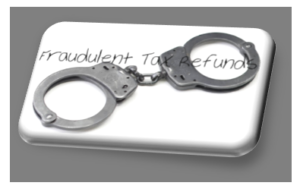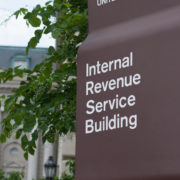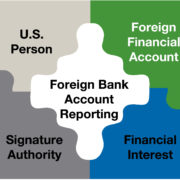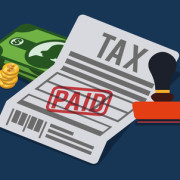Remember the Large IRS Tax Refunds? You May Have To Pay Them Back.
Fraudulent IRS tax refunds
 Each year thousands of individuals flock to tax return preparation centers in anticipation of receiving a large income tax refund from Uncle Sam. For most, the money is already earmarked for a down payment on a new car, home improvement or a vacation with most of the refund spent within 90 days of its receipt. The problem arises when the taxpayer receives a tax bill years later from the IRS and is required to repay the refund plus additional tax, interest and, in certain cases, penalties. In many cases, the bill the taxpayer receives from the IRS will cover multiple years since it takes a long time for the IRS to catch up with and prosecute crooked return preparers. While there are taxpayers who are complicit and aware that they are not entitled to those large refunds, most taxpayers are totally taken by surprise, when the IRS contacts them.
Each year thousands of individuals flock to tax return preparation centers in anticipation of receiving a large income tax refund from Uncle Sam. For most, the money is already earmarked for a down payment on a new car, home improvement or a vacation with most of the refund spent within 90 days of its receipt. The problem arises when the taxpayer receives a tax bill years later from the IRS and is required to repay the refund plus additional tax, interest and, in certain cases, penalties. In many cases, the bill the taxpayer receives from the IRS will cover multiple years since it takes a long time for the IRS to catch up with and prosecute crooked return preparers. While there are taxpayers who are complicit and aware that they are not entitled to those large refunds, most taxpayers are totally taken by surprise, when the IRS contacts them.
The statute of limitation for the assessment of income tax is generally 3 years from the date the return is filed. However, in the case of a false or fraudulent return, the tax may be assessed at any time under IRC Section 6501(c) (1) Id. The question of whether a return preparer’s fraudulent conduct (related to a taxpayer’s return) extends the statute of limitation for the taxpayer, has been the subject of debate among the courts. In addition, a taxpayer’s negligence in failing to review his or her tax return, can serve as a basis for imposition of the 20 % accuracy related penalty. In 2007 the Tax Court held that a third party preparer’s fraud extended a taxpayer’s statute of limitations (Allen v. Commissioner, (128 T.C. 37 (T.C. 2007)). However, in 2015 the Court of Appeals, in BASR Partnership v. United States, (113 Fed Cl 181 (2013) aff’d, 795 F.3rd 1338 (Fed, Cir. 2015)), rejected the Tax Court’ holding in Allen. The issue was presented once again in a 2016 Tax Court Decision styled as Finnegan v. Commissioner (T.C. Memo. 2016-118) where the Court held that in the case of a false or fraudulent return, the income tax may be assessed at any time. This case involved the tax years 1994-2001.
The Court in Finnegan also held that the taxpayers were liable for the 20% accuracy related penalty. The Court held that the taxpayers did not meet their burden of production under I.R.C. Section 7491(c). Quoting from Treas (Reg. Sec. 1.662-3(b) (1) (ii)), the Court stated that the taxpayers failed to “make a reasonable attempt to ascertain the correctness of a deduction, credit or exclusion on a return which would seem too a reasonable prudent person to be too good to be true under the circumstances” (Id. at Pg. 29).
In addition, the Tax Court, in rejecting the Court of Appeals decision in BASR noted that there was a persuasive dissent filed in BASR and also that a concurring opinion was filed that relied upon I.R.C. Section 6229, an inapplicable provision. Furthermore, the Tax Court pointed out that there is no jurisdiction for the appeal of any decision of the Tax Court to the Court of Appeals. In view of these decisions, it is important to point out that the Tax Court is the only forum, other than IRS Appeals, where a taxpayer can challenge a tax assessment without first paying the deficiency. In BASR, the taxpayer paid the outstanding deficiency and thereafter made a claim for a refund.
Tax return preparers
Individuals who have their Federal and State Income tax returns completed by an outside third party have many alternatives including using a licensed attorney, certified public accountant or enrolled agent, who has the knowledge and experience to ethically prepare tax returns in accordance with the tax laws. All things being equal, the cost to have your tax returns prepared by a licensed professional are commensurate with the fees charged by tax preparation services and other individuals. Given the repeated warnings from the IRS to stay clear of sleazy return preparers and information that is available on the internet, one would assume that consumers who have their returns prepared by outsiders would be somewhat circumspect in the selection process. After all, we review doctors, mechanics and other professionals prior to hiring them, right?
Inexplicably, many individuals spend very little time, if any, scrutinizing those who are tasked with the preparation of their income tax returns despite repeated warnings from the IRS. Nor is much time spent discerning the differences between a licensed professional, who is subject to professional standards, such as Circular 230, State Bar Ethics Rules and State Professional Regulations related to Certified Public Accountants and the impostors who operate illegally in the shadows.
Taxpayers often select a return preparer based upon a recommendation from a friend, relative or co-worker who in many cases has received a sizable tax refund. Unable to contain their joy, they naturally tell their friends, relatives, co-workers and anyone that will listen to them that: “I got a great tax guy.”
In the case of those who are new to the United States many will select a tax preparer that is from their home country and speaks their language. In most cases, the criterion for selecting a tax preparer comes down to the size of the refund.
Fraudulent tax return preparer business model
The fraudulent return preparer business model can be divided into three categories and many variations thereof. The First category constitutes return preparers who prepare fraudulent returns generating refunds to which taxpayers are not entitled. These preparers use fraudulent refunds as a means to build their tax preparation practices. They are also generally new to the game and unaware of the IRS use of analytics as a tool to detect patterns of fraud in the tax preparation industry. These return preparers may or may not charge higher fees than their licensed counterparts and sometimes may take a percentage of the refund, which, by that way, is illegal. This first category of fraudulent return preparer is fabricating returns and large refunds as part of marketing strategy designed to build a robust tax practice.
The second category of fraudulent return preparers is less concerned with building a large practice or longevity and more focused on the immediate financial gain. In many cases, the business is set up naming individuals other than the true owner as the principals for the business. For many scammers this is not their first rodeo. They are savvy enough to recruit preparers who have their own IRS identification numbers so that fraudsters’ identities remain anonymous. This also enables them to blame other preparers when the IRS uncovers the scam.
The fraud is perpetrated in the following manner. The return preparer prepares two tax returns; one that the taxpayer is shown and one that is actually filed with the IRS. In virtually every case, the client’s copy of the return reflects a much smaller refund, if any, than the refund reflected on the actual return filed with the IRS, which the client never sees. In addition, the client usually authorizes the refund to be deposited into an account controlled by the return preparer. Once the return is filed and the refund deposited, the return preparer pockets the difference between the refunds reflected on the client’s copy of the return and the higher refund received.
The third category of unethical return preparer known as the “ghost tax return preparer” has emerged over the years and was the subject of a recent IRS warning. Ghost tax return preparers are return preparers who are paid to prepare income tax returns by the public. Even though the law provides that anyone who is paid to prepare or assist in the preparation of a tax return must have a valid Preparer Tax Identification Number (PTIN), ghost return preparers are able to avoid IRS detection by not signing the tax returns they prepare. Instead, they print the returns and instruct their clients to sign and mail in the return to the IRS. In the case of e-filed returns, they prepare but refuse to digitally sign it as a paid preparer.
Fraudulent return preparers have a total disregard for their clients or the damage done to the public trust. In many cases, taxpayers are left to pick up the pieces. If a taxpayer received a tax refund to which he was not entitled; he will be required to pay the IRS back. The problem is exacerbated in situations where the IRS does not uncover the fraud and the taxpayer has received refunds for multiple tax years.
Taxpayers may first become aware that they received a tax refund to which they were not entitled to when they receive a notice from the IRS adjusting their tax liability. In many cases, the Taxpayer will receive notices for multiple tax years. In other cases, a Taxpayer may first learn of the fraud when they are contacted by either an examiner from the IRS or a special agent from Criminal Investigation, both of whom may be investigating patterns of fraud by a return preparer.
IRS crackdown on fraudulent income tax preparers
The parade of return preparers and tax preparation services that have come under investigation by the Internal Revenue Service and Department of Justice illustrates how pervasive tax preparer fraud is. In 2016, federal prosecutors shut down more than 70 Liberty Tax Franchises for improprieties related to filing fraudulent returns and over inflating refunds. Prior to this time, another 60 locations which were subject of multiple federal lawsuits shut down or were enjoined by a federal court from further operation. In December of 2018, the Department of Justice and Internal Revenue Service launched an investigation into the Franchise, Liberty Tax Company, who is responsible for the sale and operation of its franchise locations throughout the United States. The investigation is ongoing. In addition, civil lawsuits have been filed in an attempt to deal with unethical return preparer practices.
In April of 2017, a class action lawsuit was filed in the United District Court for the Central District of California against Jackson Hewett, Inc. and a number of its franchisees alleging that the Defendants obtained thousands of dollars from the IRS in the name of the Plaintiffs. In order to carry out the fraudulent scheme, the Defendants would provide its customers with a copy of a tax return that differed from the return that was actually filed. The returns that were filed with the IRS artificially reduced the clients’ federal tax liability, resulting in tax refunds being generated. The clients were unaware of the scam, since the defendants instructed the IRS to deposit the tax refunds into accounts the defendants controlled, all without the clients consent.
Attempts by the IRS and Department of Justice to curb these abuses have resulted in both criminal prosecutions and civil actions designed to enjoin the fraudulent return preparer.
On March 20, 2019 a Charlotte, North Carolina return preparer was sentenced to 24 month in prison for assisting in filing false tax returns. According to the Court documents, the return preparer was able to increase the tax refunds her clients received by claiming false refunds and reported income and expenses for fictitious businesses in order to claim the Earned Income Tax Credit. The fraudulent returns filed by the defendant resulted in a tax loss to the IRS in excess of $500,000. In a separate prosecution, a Raleigh man was indicted and charged with conspiracy to defraud the United States and 14 counts of aiding and assisting in the preparation of fraudulent returns. Among the illegitimate items claimed as deductions, the defendant claimed false education credits.
In another case, Pennsylvania man was sentenced to 12 months in prison for filing false returns and conspiring to defraud the U.S. Government. The defendant, together with a co-conspirator was convicted of preparing fraudulent tax returns during the 2007 and 2010 tax years by falsely claiming employee business expenses and other nondeductible expenses. The false deductions resulted in claims for inflated refunds. The court noted that the refunds were specifically inflated as a means to grow the defendant’s tax practice.
In March of 2019 a Texas Federal Court permanently enjoined Jhane Broadway, a Dallas Texas return preparer individually and doing business as Jeprofessionalz (aka MaxTaxPros) from preparing federal income tax returns for others. In this particular case, the Government was able to establish that the tax return preparer prepared false returns that understated the tax liabilities of her clients by claiming false, improper or inflated deductions, including fabricated itemized deductions and Schedule C business losses. On the same day, a Federal Court in Beaumont, Texas entered a permanent injunction against another female return preparer, barring her from preparing federal tax returns for others. In entering the order, the Court found that the return preparer made fraudulent claims for the Earned Income Tax Credit, the fuel tax credit and the American Opportunity Credit. In addition, the Court found that the return preparer reported fictitious business and inflated federal income tax withholdings on her client’s tax returns.
Based upon the tax court rulings in Allen and Finnegan, a taxpayer who used a fraudulent return preparer could be in for trouble, particularly if the taxpayer used the same preparer for a number of years, since the statute of limitation for assessments is likely to remain open. Moreover, if you used a fraudulent preparer, there is a good chance you will be subject to the accuracy related penalty. For those sophisticated taxpayers who participated in the fraud you may be subject to the civil fraud penalty and possible criminal prosecution.
The takeaway here is that as a consumer, you need to conduct some due diligence prior to selecting a return preparer. You should never engage an unlicensed individual, since there is little recourse available in the event of a problem. Finally, if you have been caught up in an IRS investigation related to your returns, it is time to contact an experienced and knowledgeable tax lawyer. If ever there was an appropriate term then it is “Caveat Emptor,” which means “Let the Buyer Beware.”










